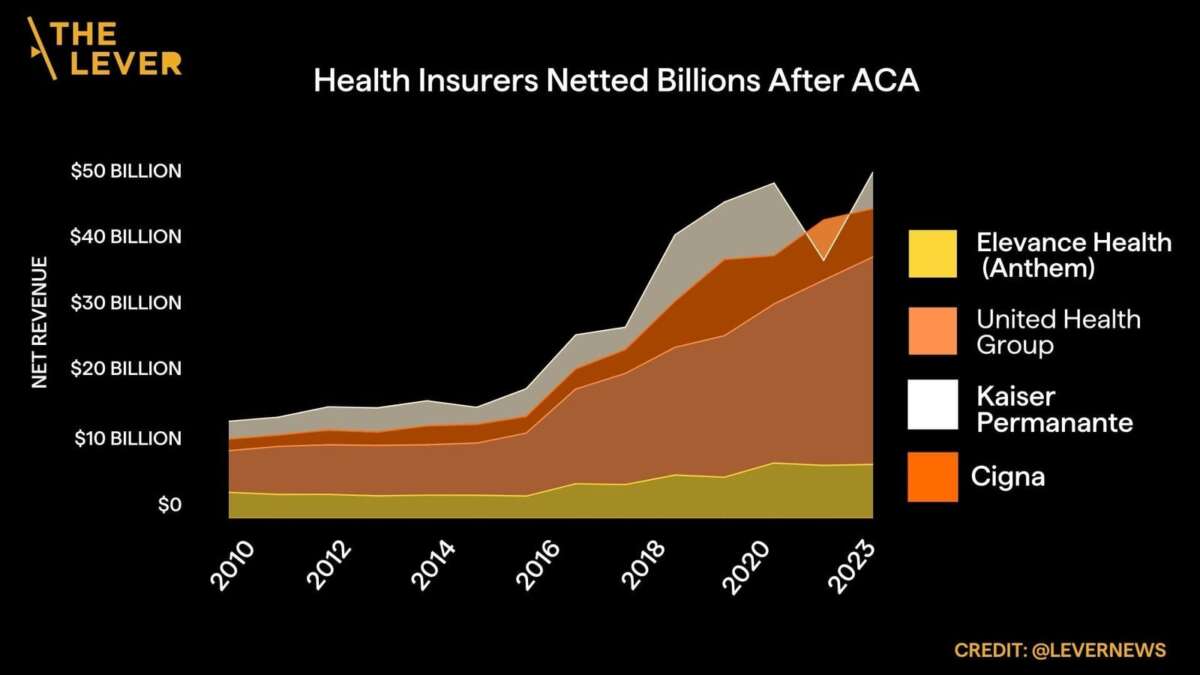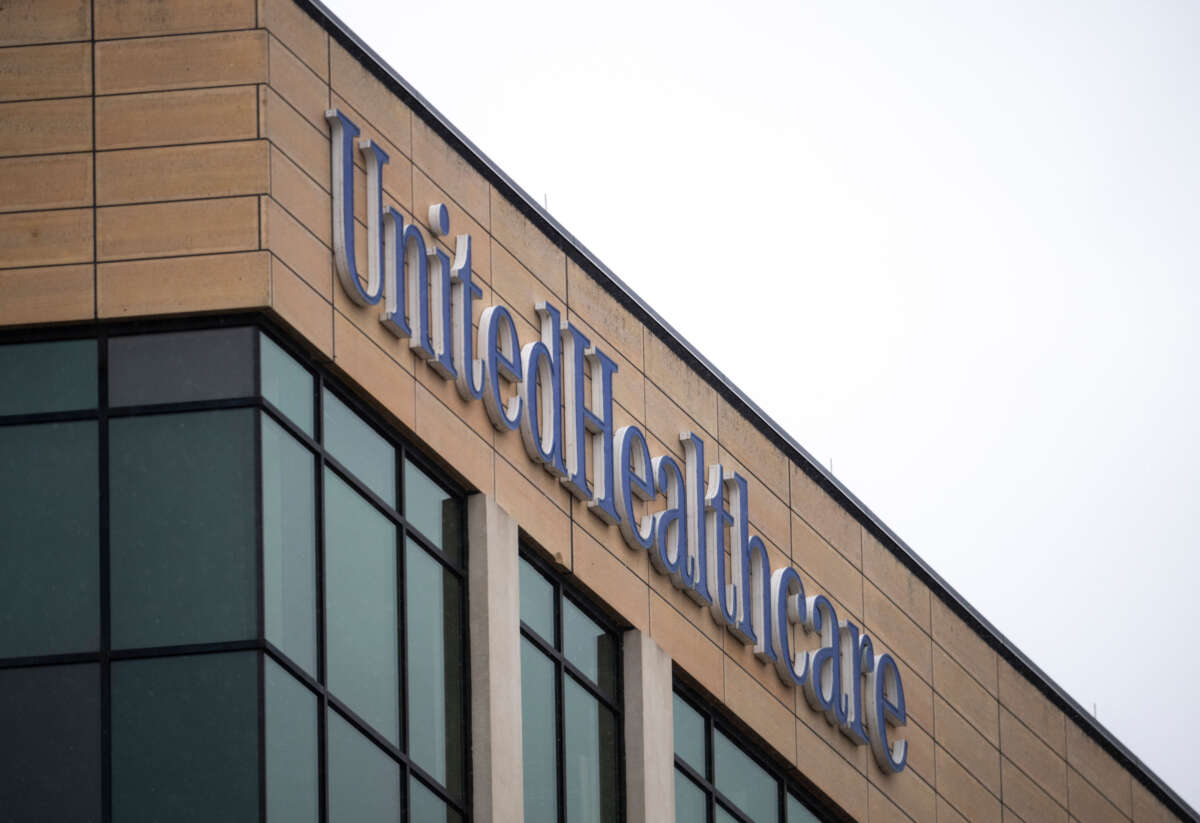Support justice-driven, accurate and transparent news — make a quick donation to Truthout today!
America’s largest health insurers have raked in more than $371 billion in profits since the passage of the Affordable Care Act, according to financial data reviewed by The Lever. More than 40 percent of that net income went to UnitedHealth Group, whose annual profits have skyrocketed by nearly 400 percent as the company now reportedly denies nearly one in three medical claims from its policyholders.
Insurers garnered these profits as the average American families’ premiums have risen to nearly $26,000 a year. In all, since the Affordable Care Act (ACA) was passed in 2010, more than $9 trillion of revenue has flowed to the country’s largest health insurance companies, which include UnitedHealth Group; Cigna; Kaiser Permanente; Elevance Health, the parent company of Anthem Blue Cross Blue Shield; and CVS Health, which acquired Aetna in 2018.
The financial data comes from the companies’ annual reports filed with the Securities and Exchange Commission and other disclosure forms.
The revenue and profits substantially increased starting in 2014, when the ACA was fully implemented. The law included a mandate for Americans to buy insurance, as well as government subsidies for such insurance policies.
Last week’s murder of Brian Thompson, chief executive officer of UnitedHealth Group’s insurance division UnitedHealthcare, has sparked an outpouring of anger towards health insurers. New Gallup polling data shows Americans’ view of health care quality has declined to a 24-year low. The same data showed that 62 percent of Americans believe “it is the responsibility of the federal government to make sure all Americans have healthcare coverage” — a decade high.

These five insurers control over half of the commercial market share of the U.S. health insurance industry. Their revenues and profits have increased as they have become larger, both because of mergers and because the Affordable Care Act’s subsidies have helped Americans buy private insurance.
“High market concentration tends to lower competition among health insurers, which can harm patients by raising insurance premiums above competitive levels,” said Jesse Ehrenfeld, president of the physician lobbying group American Medical Association, in a 2023 press release.
Patients are grappling with ever-increasing health care costs. Spending on private health coverage is set to exceed $1.5 trillion this year, according to the nonpartisan U.S. Government Accountability Office. At the same time, the quality of U.S. health care is deteriorating, based on increasing mortality rates, premature deaths, disability levels, and other measures.
UnitedHealthcare, the largest U.S. insurer covering more than 50 million people, made $23 billion in profits last year, according to UnitedHealth Group’s financial statements.
As of 2023, the CEOs of the five largest health insurers made roughly $75 million dollars combined in annual compensation.
This year, the average health insurance premium that individuals pay for employer-sponsored health insurance — the largest source of health care coverage for non-elderly Americans — increased 6 percent to almost $9,000 per year, and premiums for families increased 7 percent to just under $26,000 per year, according to the health policy research nonprofit KFF. Since 2014, the average family premium cost has risen 52 percent, outpacing inflation.
Regardless of mounting insurance costs, many Americans are still forced to pay out of pocket for procedures — or go without care — thanks to insurers’ practice of denying coverage. According to the Centers for Medicare and Medicaid Services, which manages federal health care programs, nearly 17 percent of in-network claims to insurers on the government’s health insurance exchange were denied in 2021.
A recent study asserted that UnitedHealthcare denies the most claims of any major health insurance company, rejecting about one in every three claims.
“UnitedHealthcare is the worst insurance company for paying claims,” concluded the study from the consumer spending analytics group, ValuePenguin, whose parent company is the online lending marketplace LendingTree.
Additionally, nearly one in every 12 Americans now has medical debt, with roughly three million people owing more than $10,000. The Consumer Financial Protection Bureau, an agency responsible for consumer protection in the financial sector, estimates that $88 billion worth of medical debt is reflected on individuals’ credit reports.
“When it comes to medical bills, Americans are often caught in a doom loop between their medical provider and insurance company,” Consumer Financial Protection Bureau Director Rohit Chopra said in 2022.
On Dec. 4, a masked assailant gunned down UnitedHealthcare’s CEO. Five days later, police arrested a suspect who reportedly was carrying a manifesto that criticized health insurance companies for prioritizing profits over patient care, according to reports.
Media that fights fascism
Truthout is funded almost entirely by readers — that’s why we can speak truth to power and cut against the mainstream narrative. But independent journalists at Truthout face mounting political repression under Trump.
We rely on your support to survive McCarthyist censorship. Please make a tax-deductible one-time or monthly donation.
